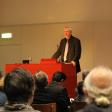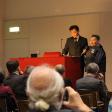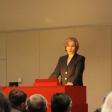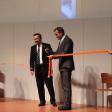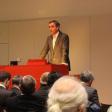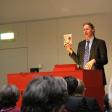On 16 November 2012, Guy Morin, President of the Basel Canton, opened the Basel Peace Office, a joint initiative of four international and four Swiss organisations to advance international peace and security through the abolition of nuclear weapons. The international organisations - World Future Council, Global Security Institute, Middle Powers Initiative and Parliamentarians for Nuclear Non-proliferation and Disarmament have come to Basel because of the growing importance of Switzerland and the growing role of cities in the achievement of a nuclear-weapons-free world. They are supported in the Basel Peace Office by the Basel Canton, University of Basel Sociology Department, Swisspeace and Swiss section of the International Physicians for the Prevention of Nuclear War.
The Office was opened by an entertaining and informative reception featuring peace music from acclaimed singer-songwriter Teresa Bergman from New Zealand, presentations from leading experts in nuclear abolition, two inspiring short videos of Basel Peace Office projects and an exhibition of paintings by Karipbek Kuyukov, a 2nd generation victim from Soviet nuclear weapons testing who is armless and paints with his feet.
Andi Nidecker, President of the Basel Peace Office, noted the peace history of Basel, including the Basel Peace Congress of Socialists of 24 November 1912 which launched an international declaration opposing war, the 1499 Treaty of Basel which ended the Swabian War, and the 1795 peace agreement between France, Prussia and Spain which was negotiated in Basel. Morin also noted that great peace philosophers, including Erasmus and Karl Jaspers, taught for periods in Basel. Erasmus is buried in Basel Minster.
Karipbek Kuyukov, Honorary Ambassador of the ATOM Project, spoke eloquently about the horrific health and environmental consequences of the Soviet nuclear tests which mean that, even today over 40 years since the end of atmospheric testing, 10% of babies born in the region are deformed or have life-threatening diseases from the trans-generational impact of the radiation.
Christine Beerli, Vice-President of the International Committee of Red Cross (ICRC) reported on the renewed engagement of ICRC in the issue of nuclear weapons. The catastrophic humanitarian consequences of any use of nuclear weapons renders their use incompatible with international humanitarian law, and thus generates an imperative for nuclear abolition – which is now being advanced by the ICRC and Red Cross and Red Crescent societies around the world (See ICRC and nuclear weapons).
Jarmo Sareva, Deputy Secretary-General of the UN Conference on Disarmament in Geneva, noted the difficulties that governments have in bridging the political divides on nuclear disarmament issues, and thus the necessity for initiatives like the Basel Peace Office to advance ideas and generate political momentum from key constituencies.
Jakob von Uexkull, Chair of the World Future Council and founder of the Right Livelihood Award noted the importance of the work of the Basel Peace Office for future generations. The world’s militaries squander human, material and financial resources – including US$1.7 trillion per year - that are needed for addressing climate change, development needs, food security and a sustainable environment.
Rudolf Rechsteiner, former Swiss member of Parliament and a Council Member of PNND, noted that the nuclear weapons that destroyed Hiroshima and Nagasaki are miniscule compared to today’s nuclear arsenal, and that parliamentarians have a key role to play in the global abolition of nuclear weapons. He also noted that nuclear energy programs provide technology and materials that could be used to develop nuclear weapons – and are thus a source of nuclear weapons proliferation. This, along with the threats to health and the environment from accidents and long-term radioactive waste, render nuclear energy an irrational and excessively dangerous energy source.
Alyn Ware, Global Coordinator of Parliamentarians for Nuclear Non-proliferation and Disarmament, highlighted the important role of parliamentarians to appropriate funds, hold governments accountable, debate policy, undertake investigations, ratify treaties, adopt implementing legislation, represent voices of public opinion, and work with parliamentarians in other countries to advance nuclear abolition. Alyn also announced that, due to the increasing importance of middle power countries like Switzerland, and thanks to some support for PNND activities from the Swiss Federal Department of Foreign Affairs, PNND was moving its head office to Basel to be part of the Basel Peace Office.
Tadatoshi Akiba, Chair of the Middle Powers Initiative and former Mayor of Hiroshima, sent a message for the Basel Peace Office opening. Akiba, as President of Mayors for Peace, a global network of cities working for nuclear weapons abolition, was instrumental in building the network from 800 member-cities to 5000, including Basel. Akiba noted the importance of mayors collaborating with parliamentarians and like-minded governments to build the political momentum required for achieving a nuclear-weapons-free world.
- Click here to see photos of the opening reception.
- Click here to watch the video of parliamentarians around the world collaborating on nuclear abolition (3 minutes. English and French)
- Click here to watch the ATOM Project video on the consequences of the Soviet nuclear tests in Kazakhstan (4 minutes. English and German)
Media reports on the Basel Peace Office opening:
- Nuclear disarmament as a goal, Badische Zeitung (German)
- Basel new headquarters in the fight against nuclear weapons, BZ: Basel Die Nordwestschweiz (German)

